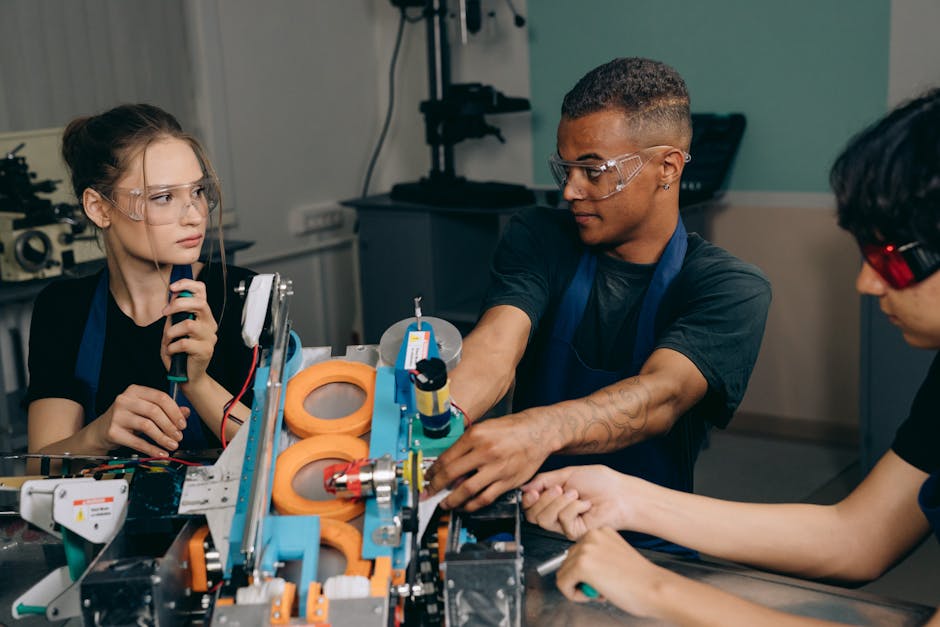Birmingham: The Heart of the UK’s Manufacturing Heritage
Birmingham, located in the West Midlands, holds a pivotal role in the history of the United Kingdom’s industrial development. The city’s legacy as a manufacturing powerhouse dates back to the Industrial Revolution, where it played a central role in driving the country’s economic growth.
Today, Birmingham stands as a testament to the diverse range of manufacturing industries that have flourished within its borders, contributing significantly to the UK’s economy. Its rich history is marked by a spirit of innovation and technological advancements, which have not only propelled the city forward but also presented it with various challenges and opportunities for adaptation.
As we delve into Birmingham’s manufacturing heritage, we explore its enduring legacy and future prospects in shaping the industrial landscape of the nation.
Key Takeaways
- Birmingham’s strategic location and abundant natural resources contributed to its rapid industrial expansion.
- Birmingham’s manufacturing sector plays a significant role in driving the overall economic growth of the UK.
- Birmingham’s commitment to embracing technological advancements ensures its continued relevance in the global market.
- Birmingham’s resilience and adaptability have been key factors in its enduring legacy as a global manufacturing leader.
Industrial Revolution and Birmingham’s Rise

The Industrial Revolution propelled Birmingham’s ascendency as the epicentre of manufacturing prowess in the UK. With the advent of mechanisation and the development of industries, Birmingham saw unprecedented growth, transforming from a small market town into a thriving industrial powerhouse. The city’s strategic location, abundant natural resources, and a network of canals and later railways, played pivotal roles in fostering its rapid industrial expansion.
Birmingham’s growth during the Industrial Revolution was fuelled by a diverse range of manufacturing industries. The city became renowned for its production of goods such as textiles, metal products, machinery, and glassware. This diversity not only solidified Birmingham’s position as a manufacturing hub but also laid the foundation for its continued industrial significance.
The city’s ability to adapt and innovate in response to the changing demands of the industrial landscape enabled it to sustain and expand its manufacturing base. This resilience and adaptability have been key factors in Birmingham’s enduring legacy as a global leader in manufacturing. The city’s success in diversifying its manufacturing industries set the stage for further economic and industrial development, shaping its identity as a powerhouse of innovation and production.
Diversity of Manufacturing Industries

Birmingham’s diverse manufacturing industries encompass textiles, metal products, machinery, and glassware, solidifying its position as a leading hub of industrial innovation and production. The city’s industrial landscape is characterised by its varied manufacturing sectors, each contributing significantly to the region’s economic vitality and global influence.
-
Textiles: Birmingham has a rich history in textile manufacturing, with a focus on high-quality fabrics and innovative production techniques that have sustained its prominence in the global textile market.
-
Metal Products: The city’s expertise in metalworking spans from traditional craftsmanship to cutting-edge technologies, ensuring the production of a wide range of metal products for diverse industries worldwide.
-
Machinery and Glassware: Birmingham’s manufacturing prowess extends to machinery and glassware, with the city being renowned for its precision engineering and high-quality glass products that cater to both domestic and international markets.
Furthermore, Birmingham’s manufacturing diversity is exemplified by its significant contributions to automotive production and aerospace engineering. The city’s advanced manufacturing facilities play a pivotal role in driving innovation and excellence in these key sectors, further solidifying its status as a powerhouse of industrial diversity and ingenuity.
Impact on the UK’s Economy

Birmingham’s rich manufacturing heritage has had a profound impact on the UK’s economy, shaping it into what it is today. The city’s economic influence extends far beyond its borders, with its manufacturing sector playing a significant role in driving the overall economic growth of the country.
Understanding the specific contributions of Birmingham’s manufacturing industries to the UK’s economy is essential for appreciating the city’s historical and ongoing significance.
Birmingham’s Economic Influence
At the forefront of the UK’s economic landscape, Birmingham’s manufacturing prowess has significantly shaped the nation’s economy. Birmingham’s economic influence is evident through:
-
Economic Growth: The city’s vibrant manufacturing sector continues to be a key driver of economic growth, contributing to the overall prosperity of the UK.
-
Industrial Development: Birmingham’s rich industrial history has laid the foundation for a diverse and innovative industrial landscape, fostering the development of various sectors and driving national productivity.
-
Innovation Hub: The city’s focus on research and development, combined with a skilled workforce, has positioned Birmingham as an innovation hub, attracting investment and propelling the UK’s economic competitiveness.
Birmingham’s economic influence extends far beyond its borders, playing a pivotal role in shaping the UK’s economic trajectory. This influence becomes even more pronounced when considering manufacturing’s economic contribution.
Manufacturing’s Economic Contribution
With its significant impact on the UK’s economy, manufacturing plays a crucial role in shaping the nation’s economic landscape. The table below showcases the key contributions of the manufacturing sector to the UK’s economy, emphasising its role in driving economic growth and job creation.
| Economic Contribution | Impact |
|---|---|
| GDP Growth | Manufacturing significantly contributes to the UK’s GDP growth, driving overall economic expansion. |
| Job Creation | The sector creates a substantial number of jobs, providing employment opportunities and supporting livelihoods. |
| Exports | Manufacturing exports play a vital role in balancing the trade deficit and bolstering the country’s international trade position. |
| Innovation | The industry fosters innovation, driving technological advancements and enhancing the UK’s competitiveness in the global market. |
These factors underline the critical role of manufacturing in sustaining and enhancing the UK’s economic prosperity.
Innovation and Technological Advancements

The evolution of manufacturing in Birmingham has been driven by constant innovation and technological advancements. Birmingham’s manufacturing sector has thrived due to its commitment to embracing technological innovation and industry advancements.
-
Advanced Automation: Birmingham’s manufacturing industry has embraced advanced automation technologies, such as robotics and artificial intelligence, to streamline production processes and improve efficiency.
-
Digital Integration: The integration of digital technologies, including Internet of Things (IoT) devices and data analytics, has revolutionised manufacturing operations in Birmingham, enabling real-time monitoring and predictive maintenance.
-
Sustainable Practises: Birmingham’s manufacturing firms have adopted sustainable practises, leveraging technological advancements to reduce environmental impact through energy-efficient processes and waste reduction initiatives.
These advancements have not only enhanced productivity and quality but have also positioned Birmingham as a leader in modern manufacturing practises. The city’s commitment to embracing technological innovation has paved the way for a sustainable and competitive manufacturing landscape, ensuring its continued relevance in the global market.
Challenges and Adaptations Over Time

Amidst the evolution of manufacturing in Birmingham driven by technological innovation and advancements, the sector has encountered a series of challenges necessitating strategic adaptations over time. One of the foremost challenges has been the changing workforce dynamics. As the industry becomes more automated and technologically advanced, the demand for a highly skilled and tech-savvy workforce has increased. This has led to the need for adaptation strategies to ensure that the workforce is equipped with the necessary skills to operate and maintain advanced manufacturing technologies. Moreover, the sector has also faced challenges in terms of global competition, market fluctuations, and environmental sustainability, all of which have required strategic adaptations to ensure the continued growth and success of Birmingham’s manufacturing industry.
| Challenges | Adaptation Strategies |
|---|---|
| Changing workforce dynamics | Continuous training and upskilling programmes to meet technological demands |
| Global competition | Diversification of product lines and expansion into new markets |
| Market fluctuations | Agile production processes and supply chain management |
| Environmental sustainability | Implementation of green manufacturing practises and renewable energy sources |
| Technological advancements | Investment in research and development, and integration of Industry 4.0 technologies |
Legacy and Future Prospects

As Birmingham’s manufacturing sector navigates through the challenges of workforce dynamics, global competition, market fluctuations, and environmental sustainability, it leaves behind a rich legacy while setting its sights on promising future prospects.
-
Historical Significance: Birmingham’s manufacturing legacy dates back to the Industrial Revolution, positioning it as a pioneering hub for innovations in metalworking, textiles, and machinery. This historical significance serves as a foundation for the city’s identity and expertise in manufacturing.
-
Future Advancements: The future prospects for Birmingham’s manufacturing sector are marked by advancements in technology, automation, and sustainable practises. Embracing digitalisation and smart manufacturing, the city is poised to lead the way in leveraging cutting-edge solutions for enhanced productivity and efficiency.
-
Global Competitiveness: With a focus on diversification and upskilling the workforce, Birmingham aims to maintain its global competitiveness while fostering collaboration with international partners. This strategic approach is instrumental in securing a prominent spot in the global manufacturing landscape.
Birmingham’s manufacturing sector cherishes its historical significance while actively pursuing future advancements, positioning itself as a resilient and forward-thinking cornerstone of the UK’s industrial heritage.
Frequently Asked Questions
Can You Provide Specific Examples of the Impact of Birmingham’s Manufacturing Heritage on the Global Economy?
The impact of Birmingham’s manufacturing heritage on the global economy is substantial, with specific examples including its pivotal role in the Industrial Revolution, the development of mass production techniques, and its influence on global supply chains.
How Has Birmingham’s Manufacturing Industry Adapted to the Rise of Automation and Digital Technologies?
In adapting to automation challenges, Birmingham’s manufacturing industry has embraced digital transformation strategies. Leveraging advanced technologies, such as AI and robotics, has optimised production processes, increased efficiency, and enhanced competitiveness on the global stage.
What Are Some Lesser-Known Industries That Have Contributed to Birmingham’s Manufacturing Legacy?
In Birmingham’s manufacturing legacy, lesser-known industries like jewellery making, gunsmithing, and metalworking have played pivotal roles. Their innovation and craftsmanship were essential during the Industrial Revolution and continue to thrive with modern technologies, shaping Birmingham’s industrial heritage.
How Has Birmingham’s Manufacturing Heritage Influenced the City’s Cultural and Artistic Identity?
Birmingham’s manufacturing heritage has profoundly influenced its cultural and artistic identity. The city’s rich history of industrial revolution has shaped its cultural expression, fostering artistic innovation and contributing to urban development, creating a unique and dynamic artistic landscape.
What Are Some of the Key Challenges That Birmingham’s Manufacturing Industry Has Faced in Recent Years, and How Have They Been Addressed?
Recent challenges in Birmingham’s manufacturing industry include global competition, technological advancements, and economic fluctuations. Innovations in automation, sustainable practises, and workforce training have addressed these challenges, enhancing global influence and driving economic growth.
Conclusion
In light of Birmingham’s rich manufacturing heritage, it is evident that the city has played a pivotal role in shaping the UK’s industrial landscape.
From the Industrial Revolution to its diverse manufacturing industries, Birmingham has made a lasting impact on the country’s economy.
As the city continues to innovate and adapt to challenges, its legacy as the heart of the UK’s manufacturing heritage is secure, paving the way for future prospects and advancements.
Contact us to discuss our services now!
